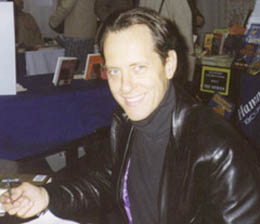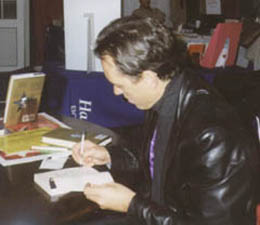Withnail And You: A Cult Fave Resurfaces
L.A. Times
Those who missed the 1987 British comedy the first time around can join its fervent followers with its return on cassette.
By: Donald Liebenson – Donald Liebenson is a Chicago-based freelancer who writes about home video
Count on the video re-release of “Withnail & I” to be celebrated by a heretofore secret society of devotees, a growing cult whose fanatical devotion to the film borders on the pathological. Comedian Margaret Cho says she has seen the 1987 misfit British comedy more than 40 times. Paul Rudd, co-star of “William Shakespeare’s Romeo and Juliet,” claims to have seen it 60 times. Steve Martin simply calls it “one of the best comedies of the 1980s.”
“Withnail & I” is available on the Anchor Bay Entertainment label for the suggested price of $14.95. That the video has been off the market five years has only fueled its underground status and made the original video release a prized commodity for retailers lucky enough to own a copy. At Rocket Video on La Brea Avenue, a copy the store recently procured (“We paid a lot of money for it”) has rented 26 times in less than a month. Since 1988, Vidiots in Santa Monica has gone through five copies (some wore out, others were stolen), which have cumulatively rented an estimated 955 times. One customer recently paid $200 for a copy. It is with no understatement that Jay Douglas, Anchor Bay vice president of acquisitions, said, “We’re glad to have the film. We feel we’re doing a public service.”
Not that he fully appreciated just what he had when he acquired “Withnail” as part of the Handmade Films library, which includes films with more consumer awareness and box-office cachet, including “The Long Good Friday” and “Mona Lisa” (already released) and “Time Bandits” and Monty Python’s “Life of Brian” (next summer). “The conventional thinking was the most commercial of the films would have been ‘Time Bandits’ and ‘Life of Brian,’ ” Douglas said, “but the most calls we’ve gotten are about ‘Withnail & I.’ I’m still trying to figure out how I missed it the first time around.” He’s not alone. The film grossed $1.4 million in its original U.S. run–a decent showing for an art-house film of that era–but it obviously has escaped the attention of much of the moviegoing public.
“Withnail & I” was directed by Bruce Robinson, an actor and writer who was nominated for an Academy Award for his screenplay for “The Killing Fields.” The semiautobiographical “Withnail” was based on his experiences with a fellow drama student named Vivian, who, Robinson notes in the 10th-anniversary edition of the screenplay, “was brilliant at being Vivian.” Richard E. Grant, in his first film role, stars as the Byronesque Withnail, with Paul McGann as “I.” They are decrepit young actors in 1969 London who are “drifting into the arena of the unwell” and who take an ill-fated holiday at the miserable country home of Withnail’s flamboyantly grandiloquent Uncle Monty.
Grant said he faced two obstacles in getting the role. First, he was allergic to alcohol and didn’t smoke cigarettes, two activities his character did to excess. Second, Daniel Day-Lewis was up for the role, and at the time he had just gained acclaim for “My Beautiful Laundrette” and “A Room With a View.” “He was offered everything at that point,” Grant said. “[But] he chose to do ‘The Unbearable Lightness of Being.’ When I worked with him on ‘Age of Innocence,’ I literally got down on my knees and said, ‘Thank you, O Daniel.’ ”
In England, “Withnail & I” has inspired proselytes to make pilgrimages to the film’s locations, such as Regent’s Park in London, where a solitary Withnail delivers a climactic wine-enhanced soliloquy from “Hamlet” to a cage of wolves. The film has also spawned a drinking game in which participants try to match drink for drink what the characters imbibe (the lighter fluid, which a desperate Withnail downs at one point, is not recommended). It was serendipity that “Withnail” was re-released theatrically this year in England while Grant was touring the country to promote his published collection of film diaries. “During the question-and-answer,” he said in a phone interview, “the thing people wanted to know about was this movie–what you would think would totally be trivial, the most ridiculous information, they couldn’t have enough of it. I said, ‘What is wrong with you people, you’re sick in the head.’
Grant said he finds it extraordinary that this unassuming, low-budget film could arouse such ardor a decade later. “At the time that we made it,” he said, “they said the title would have to be changed. . . . There was no sex other than Richard Griffiths’ Uncle Monty making assignations toward Paul McGann. It had none of the things that were supposed to make people go into a theater. But it just struck a chord in England in a way that nobody could have foreseen.” The “Withnail” phenomenon seems more like a subculture, rather than a community affair in the way of “The Rocky Horror Picture Show” and “Star Trek.” In England, students make up much of the most passionate “Withnail” fan base, says Ian Nathan, an editor for Empire, a British film magazine that has long championed the movie. “The whole idea of living in squalor and alcohol being a guiding principle in life are very much part of Britain’s student culture,” Nathan said. “The characters are very much lone figures with an us-against-the-world attitude that people really appreciate.”
In the United States, “Withnail” has found its audience on video. One employee at the Beverly Hills Video Center said, “A lot of people come into our store for the first time just because we have this movie.” Said Margaret Cho: “I liked the look of the video box. I watched it and I just screamed and howled. It’s one of the funniest films ever made. But it’s not that simple. It reflects the changing of the times and of the seasons in someone’s life. My ritual is that when I have to leave early [in the morning] to go on a trip, I’ll watch a little bit of ‘Withnail’ while waiting for the car so I will be soothed for my long journey.” Actor Donal Logue, of the just-canceled CBS series “Public Morals,” rhapsodizes about the film, peppering his ruminations with its dialogue: “There isn’t a moment that isn’t rich. I think in film there is the element of the ghost in the machine. I’ve worked on a lot of movies, and they’re logistical nightmares to make. For a movie like this to come together, where all the elements caught everybody at their stride, to me it’s a marvel, like a great musical experience when all the elements are chiming correctly.”
Paul Rudd views Grant’s performance as “a tremendous acting lesson.” “When you get to that level of drunkenness . . . you imagine yourself to be exactly like Richard E. Grant is. After a few Scotches, I would love to think of myself as sharp-tongued, erudite, a cynic who is painfully funny.” Like those who can quote “This Is Spinal Tap” and “Monty Python and the Holy Grail” verbatim, “Withnail” fans find a common bond in some of the script’s most memorable lines: “We’re on holiday by mistake.” “Yet again that oaf has destroyed my day.” “I mean to have you–even if it must be burglary.” Grant often hears these words recited back to him. “People will not let me forget it,” he said. “When I’m working in the States or gone through airports or been in Godforsaken places where I wouldn’t have expected anybody to have found this movie, there is always one person who has that look in their eye and will come over and say that they know about this movie, as though they’re the only person on the planet that knew about it.” Grant regards the film as his calling card in Hollywood. He recalled meeting Robin Williams at an Oscar party and, at the behest of Julia Roberts, being introduced to Steven Spielberg on the set of “Hook.” Both, he said, addressed him as “that Withnail guy.” Tim Curry, who 20 years later still fends off questions about “Rocky Horror,” warned Grant about this. “When I was working on ‘L.A. Story,’ ” Grant said, “I met him through a mutual friend. He said to me that no matter how long I lived, it was going to haunt me. I said that I’d rather be haunted than totally ignominious and anonymous.”
“Withnail” is not yet scheduled for a theatrical re-release in the United States, but a representative of Toronto-based Paragon Entertainment, which owns Handmade Films, said talks with distributors are in progress. Until then, the video release will make “Withnail” more accessible–a mixed blessing to its fans, who are on the one hand proprietary but on the other willful in compelling non-initiates to watch. “Everyone who knows me has seen the film,” Cho said, laughing. “It’s the introduction to me.” “The true fanatics insist it’s nice to have a gem that is somewhat secret,” Rudd said. “But for the people involved [in making the film], you want as many people to see it as possible. I’ve probably turned 30 people on to the movie, so I’m obviously not too private in my enjoyment of the film.”
 The REG Temple is the official website for actor, author and director Richard E. Grant.
The REG Temple is the official website for actor, author and director Richard E. Grant.







